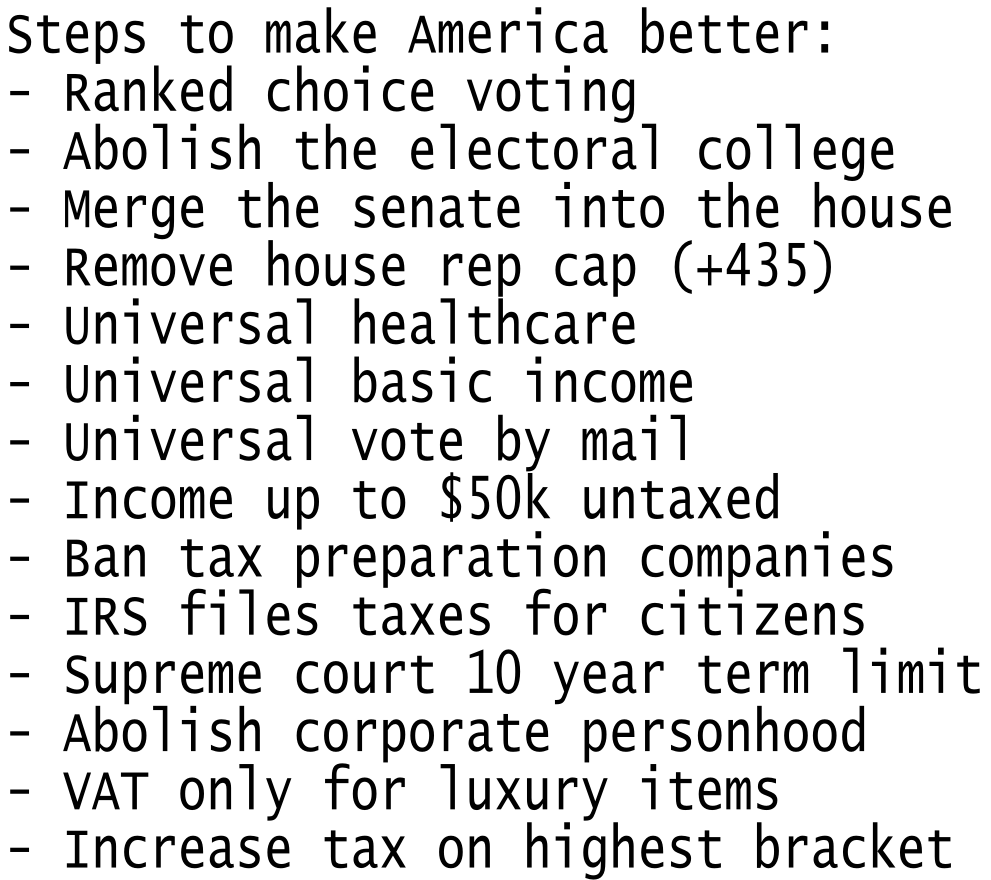this post was submitted on 07 Mar 2024
993 points (91.3% liked)
General Discussion
12066 readers
2 users here now
Welcome to Lemmy.World General!
This is a community for general discussion where you can get your bearings in the fediverse. Discuss topics & ask questions that don't seem to fit in any other community, or don't have an active community yet.
🪆 About Lemmy World
🧭 Finding Communities
Feel free to ask here or over in: !lemmy411@lemmy.ca!
Also keep an eye on:
- !newcommunities@lemmy.world
- !communitypromo@lemmy.ca
- !new_communities@mander.xyz
- !communityspotlight@lemmy.world
- !wowthislemmyexists@lemmy.ca!
For more involved tools to find communities to join: check out Lemmyverse!
💬 Additional Discussion Focused Communities:
- !actual_discussion@lemmy.ca - Note this is for more serious discussions.
- !casualconversation@lemm.ee - The opposite of the above, for more laidback chat!
- !letstalkaboutgames@feddit.uk - Into video games? Here's a place to discuss them!
- !movies@lemm.ee - Watched a movie and wanna talk to others about it? Here's a place to do so!
- !politicaldiscussion@lemmy.world - Want to talk politics apart from political news? Here's a community for that!
Rules
Remember, Lemmy World rules also apply here.
0. See: Rules for Users.
- No bigotry: including racism, sexism, homophobia, transphobia, or xenophobia.
- Be respectful. Everyone should feel welcome here.
- Be thoughtful and helpful: even with ‘silly’ questions. The world won’t be made better by dismissive comments to others on Lemmy.
- Link posts should include some context/opinion in the body text when the title is unaltered, or be titled to encourage discussion.
- Posts concerning other instances' activity/decisions are better suited to !fediverse@lemmy.world or !lemmydrama@lemmy.world communities.
- No Ads/Spamming.
- No NSFW content.
founded 1 year ago
MODERATORS
you are viewing a single comment's thread
view the rest of the comments
view the rest of the comments

This is very interesting, but I'm struggling to see how it would work within our current system of single-district representatives. Would Congressional Districts be abolished, and each state pick their allocated Congressmen through Approval Voting? I also don't see what benefits Approval Voting has over Rank Choice Voting other than simplicity.
There's plenty of ways to do it. The simplest would be to quintuple the size of the house and elect five winners to every district. Literally nothing else would have to change. Five member districts are considered the smallest that are functionally immune to gerrymandering efforts.
A more reasonable suggestion is to start implementing these reforms on the state and local level, where referendums are possible and you have an easier time building a big enough organization to actually get shit done.
As for Approval vs RCV, the simplest answer is that they usually agree on the results [all the way down the line]https://electionscience.org/commentary-analysis/super-tuesday-deep-voting-methods-dive/), but approval is simpler and easier in every respect. Both systems tend to produce a candidate support graph that looks like exponential decay in real life. The complicated answer gets into voting theory/math and all sorts of technical criterion. While I think those arguments are valid, most poling and real world data seem to show that basically anything other than "choose one" is good enough, so I prefer the method that is easiest to explain to voters and hardest for candidates to claim shenanigans.
Interesting, I've never heard about this system before, it definitely sounds interesting. I think this will be my next rabbit hole, thanks for sharing!